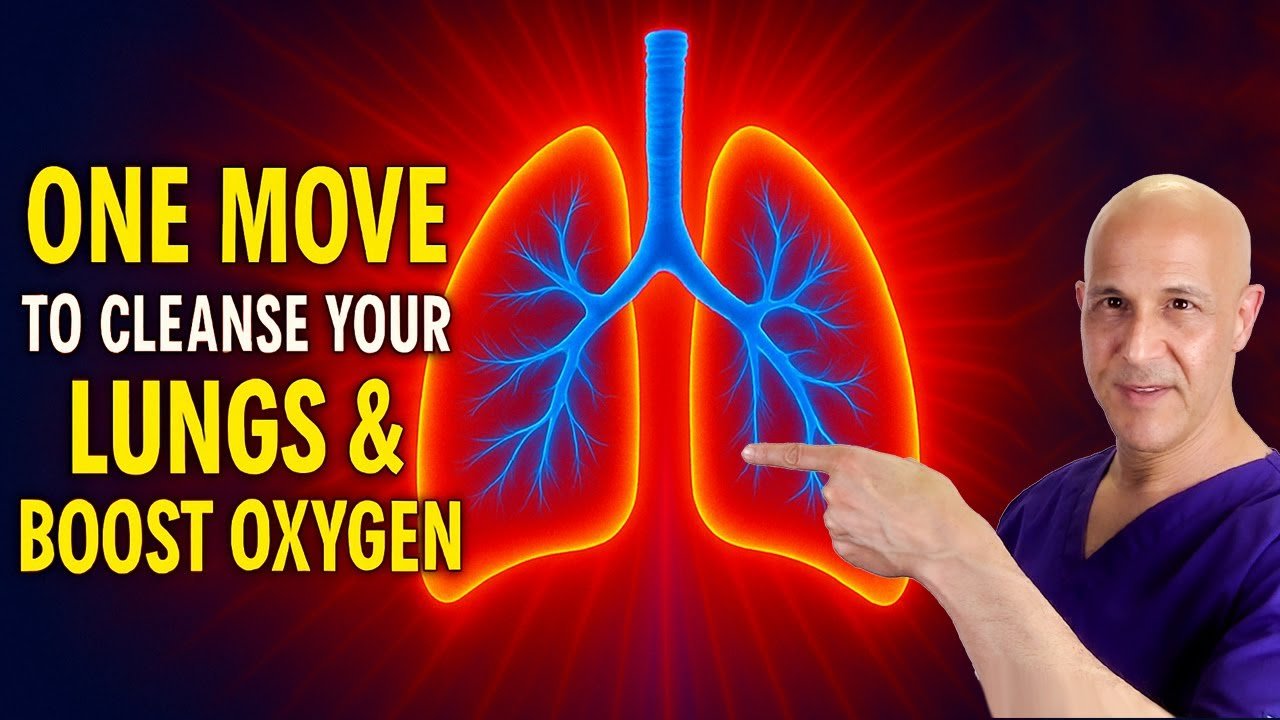Strengthen your lungs and improve your breathing with simple exercises. Dr. Alan Mandell’s tips on boosting lung health and preventing breathing issues.
Introduction: Hello everyone, Dr. Alan Mandell here with you! 🌟 Today, I’m going to share some valuable tips to help you strengthen your lungs and improve your breathing. We all know how important our lungs are for overall health, as they supply oxygen to every cell in our body. If our lungs are weak or congested, it affects our body’s ability to function properly.
Lung health is often overlooked until we face breathing issues or lung-related diseases. But here’s the truth: it’s never too late to start taking care of your lungs! So, let’s dive into some easy and effective exercises that can improve your lung capacity and overall health. 🌬️
How the Lungs Work and Why It’s Important to Strengthen Them
Our lungs are responsible for taking in oxygen and expelling carbon dioxide. This is essential for the proper functioning of every organ, tissue, and cell in our body. Oxygen is absorbed into the blood through tiny air sacs in the lungs called alveoli. When we inhale, our diaphragm contracts and pulls down to make space for the air, and when we exhale, the diaphragm relaxes to release the air.
But did you know that many of us are only using 70-80% of our lung capacity on a daily basis? That means a significant portion of our lungs isn’t being fully utilized for oxygen exchange. This can lead to breathing difficulties, especially when we’re exposed to pathogens or pollutants. To avoid this, strengthening your lungs and diaphragm is crucial! 💪
The Impact of Poor Breathing on Health
Dr. Alan Mandell explains that if we only use a small percentage of our lung capacity, it can affect our health in several ways. Limited airflow to our lungs can make us more vulnerable to infections, respiratory problems, and conditions like COPD or emphysema. Additionally, insufficient oxygen can lead to fatigue, poor circulation, and reduced energy levels.
Breathing is the body’s natural way of bringing in oxygen and eliminating carbon dioxide, but when we fail to practice deep breathing, we limit the oxygen supply to vital organs such as the heart, brain, and kidneys. By strengthening our lungs, we increase their capacity to take in more oxygen, improving overall health. 💨
Breathing Exercises to Improve Lung Function
Now that you understand the importance of lung health, let’s move on to some practical exercises you can start doing right away! Dr. Alan Mandell shares a few simple yet effective techniques that will help expand your lungs, increase oxygen intake, and improve your breathing capacity.
- Diaphragmatic Breathing:
- Place your fingers under your ribcage to locate your diaphragm.
- Breathe deeply through your nose, allowing your diaphragm to expand as it pulls down.
- Hold the breath for a moment and then exhale slowly through your mouth.
- Repeat this exercise 5 times, focusing on breathing from the diaphragm rather than the chest.
- Resistance Breathing:
- Cross your arms over your chest to create resistance on your ribcage.
- Inhale deeply through your nose while pressing gently on your ribcage.
- Exhale through your mouth slowly.
- Repeat for 5-10 breaths to strengthen your ribcage muscles and improve lung expansion.
- Abdominal Breathing:
- Inhale through your nose, filling your lungs with as much air as possible.
- As you breathe in, pull your stomach inward toward your spine, forcing the air out.
- This will help cleanse your lungs and improve your breathing efficiency.
- Repeat this technique 5 times for optimal results.
The Benefits of Proper Breathing Techniques
When you practice these breathing exercises, you’re strengthening your diaphragm, increasing lung capacity, and allowing your body to absorb more oxygen. Dr. Alan Mandell emphasizes that these exercises not only help with breathing but also enhance circulation, reduce inflammation, and support your body’s overall health. With regular practice, you’ll experience better oxygenation throughout your body, leading to improved energy, focus, and immune function. 🧠💪
Additional Tips for Improving Lung Health
In addition to breathing exercises, here are some other tips shared by Dr. Alan Mandell that can boost lung health:
- Stay Hydrated: Drink plenty of water to keep your lungs moist and functioning properly.
- Avoid Pollutants: Limit exposure to pollutants, smoke, and allergens that can harm your lungs.
- Exercise Regularly: Engage in physical activities like walking, jogging, or swimming to increase lung capacity.
- Practice Deep Breathing Daily: Make deep breathing a part of your daily routine to ensure optimal lung function.
The Role of Diet in Lung Health
What you eat can have a significant impact on your lung health. Dr. Alan Mandell suggests incorporating foods rich in antioxidants and anti-inflammatory properties into your diet. Fruits and vegetables such as berries, leafy greens, and citrus fruits help reduce inflammation in the lungs and protect them from damage. Omega-3 fatty acids from foods like flaxseeds, walnuts, and fatty fish can also improve lung function and reduce the risk of respiratory diseases. 🥗🍓
Conclusion: Strengthen Your Lungs and Breathe Better
In conclusion, strengthening your lungs and improving your breathing capacity is essential for maintaining overall health. By following Dr. Alan Mandell‘s tips, such as diaphragmatic breathing, resistance breathing, and incorporating healthy foods into your diet, you can significantly improve your lung health. Don’t wait until breathing becomes a problem—start today to strengthen your lungs and protect your body from respiratory issues.
Subscribe to Dr. Alan Mandell’s YouTube Channel
For more expert health tips and breathing exercises, subscribe to Dr. Alan Mandell’s YouTube Channel. Stay informed, stay healthy, and keep breathing easy! 🌬️
Dr. Alan Mandell’s Intro:
Dr. Alan Mandell is a renowned health expert who has helped countless individuals achieve better health through natural remedies and lifestyle changes. His approach combines the power of science and nature to improve overall well-being.
